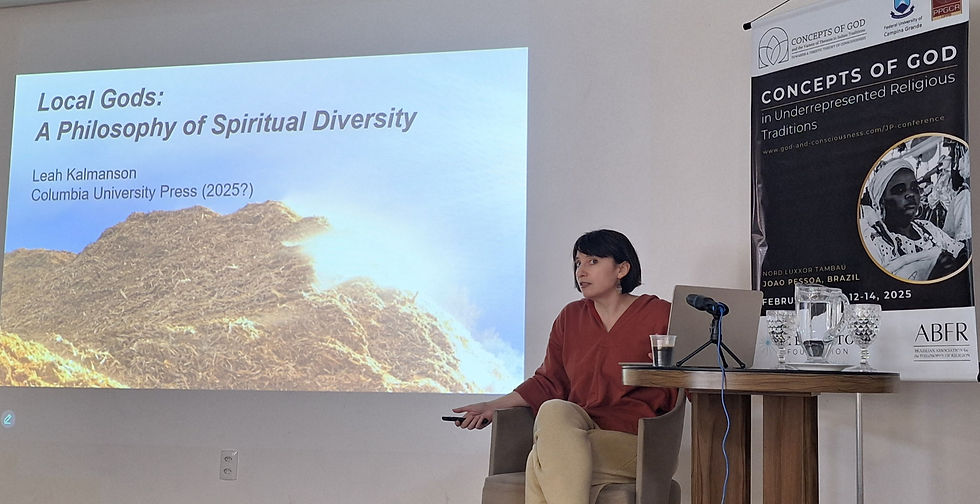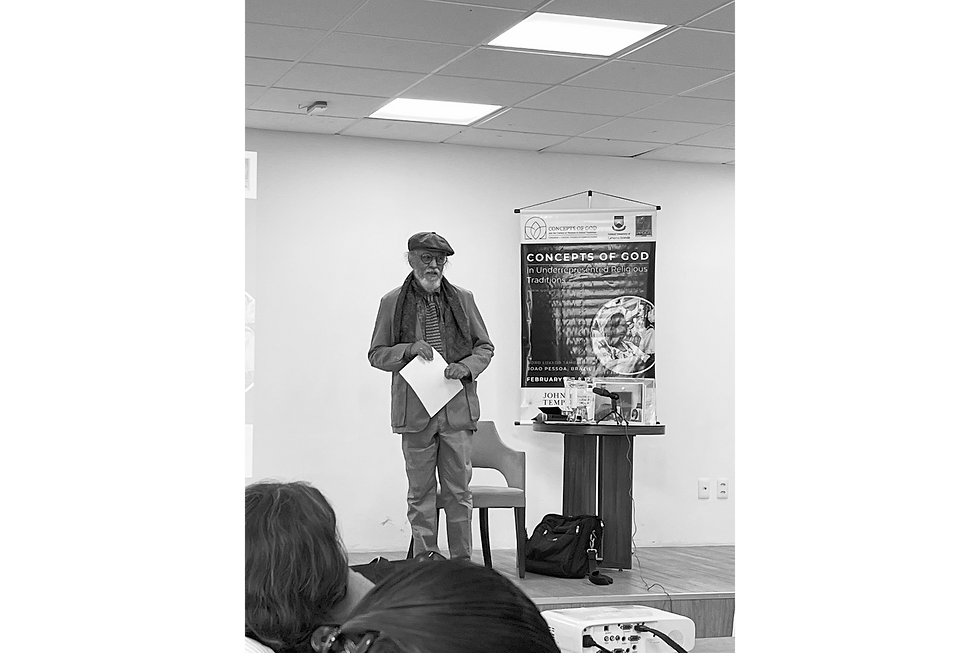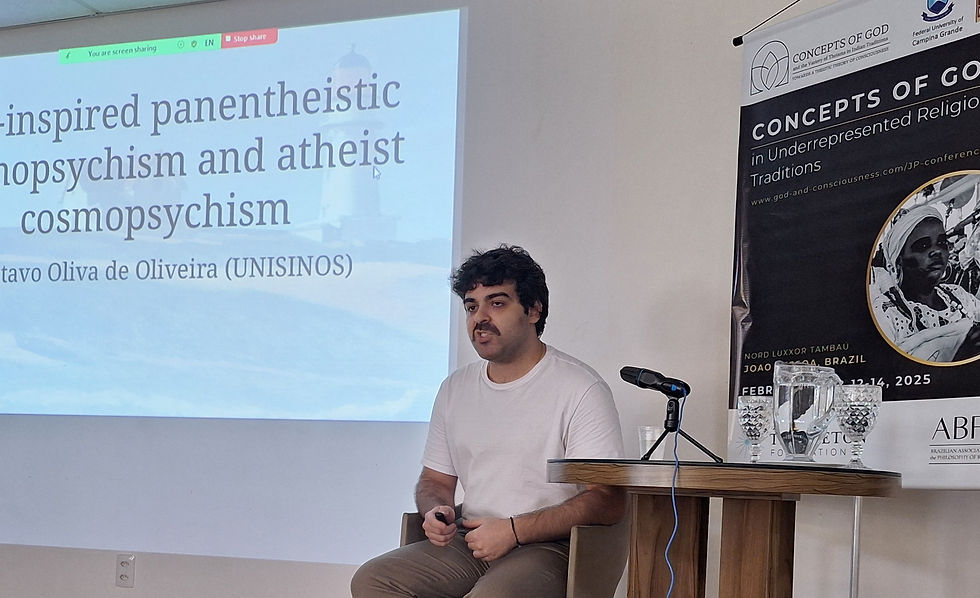CONCEPTS OF GOD
in Underrepresented Religious Traditions
Nord Luxxor Tambaú, João Pessoa, Brazil
February 6-7 and 12-14, 2025
The link to the recorded sessions will be posted soon
Click here to download the program of the conferece





Although the debates concerning concepts of God have regained considerable momentum in Western philosophy of religion since the 1960s, they mainly focus on concepts of God emerging out of the Abrahamic religions and the philosophical traditions informed by Western theology. There is a growing awareness nowadays that such an approach might conceal and prohibit a culturally sensitive and philosophically adequate appreciation of the numerous concepts of God found in religious traditions outside of the Abrahamic domain. This increasing awareness, which is part of the motivation beyond what has become known as cross-cultural and global philosophy of religion, encompasses both the need for and the encouragement of new dialogues between Western philosophy of religion and so-called underrepresented religious traditions.
By "underrepresented religious traditions," we mean religious traditions that have been largely excluded from the philosophical debate on God throughout the history of philosophy, especially in the past few decades within analytic philosophy of religion. These traditions include, but are not limited to: Indian religious traditions, Confucianism, Taoism and Zoroastrianism, Afro-Brazilian and African religions, and Amerindian and Australian Aboriginal religions.
Regarding the concepts of God or divinity found in these underrepresented religious traditions, the following questions might be posed:
-
Can the concepts of Divine of such traditions be regarded monotheistic in the Western sense of the term? Or are they closer to panentheism, pantheism, henotheism or polytheism?
-
What divine properties do the traditions ascribe to their respective divinity or sets of divinity?
-
If these concepts of the Divine cannot be neatly categorized as monotheistic, panentheistic, henotheistic, or polytheistic, or if they do not align with a divine properties approach, are there other philosophically coherent models that can be applied to them?
-
Can the corresponding concepts of God be described in a consistent way? And is it sensible to presuppose that they should be describable in such a way?
-
Do any of these concepts of God possess an advantage over Western philosophical accounts of God?

Call for Complete Papers
We are pleased to announce that the Call for Papers for our post-event publications is now open. There will be two publications, both aimed at bringing together high-quality papers that engage with the thought-provoking philosophical issues mentioned above:
-
A volume entitled "Concepts of God and the Variety of Theisms in Indian Traditions," co-edited by Ricardo Silvestre, Alan Herbert, and Purushottama Bilimoria, to be published in the Springer book series Sophia Studies in Cross-cultural Philosophy of Traditions and Cultures;
-
A special issue of Sophia on Concepts of God in Underrepresented Religious Traditions, guest-edited by Ricardo Silvestre, Alan Herbert and Purushottama Bilimoria.
Papers addressing Indian traditions will be considered for publication in (1), while papers focusing on religious traditions other than Indian traditions will be considered for publication in (2). All submissions will undergo a double-blind peer review process. Papers should be anonymized and should not exceed 10,000 words. The submission deadline is November 3th, 2025. For (1), please submit a PDF version of your paper to god.and.consciousness@gmail.com. For (2), please submit the paper directly via Sophia's Editorial Manager.
Plenary Talks

University of San Francisco, USA
Gods, devata-s, and Postcolonial Philosophy of Religion

University of North Texas, USA
Ghosts, Gods, and Spirits in Chinese Discourses on Self-Cultivation

Pontifical Catholic University of Rio de Janeiro, Brazil
Concepts of Divinity in Afro-Brazilian Religious Traditions


University of Alberta, Canada
Sacrality in Indigenous America: Camac and the Everpresent Sacrality of Life in Andean Thought

Oxford Centre for Hindu Studies, UK
Western Models of God and Indian Concepts of the Absolute


National Open University of Nigeria, Nigeria
Concepts of God in African Traditional Religions
Contributed Talks
-
A new approach to the various concepts of God in light of negative theology, Ana Maria Silva (University of Brasília, Brazil)
-
A Panpsychist Approach to Divine Presence in Sacred Objects, Gabriel Reis (Saint Louis University, USA)
-
Beyond Dualities: Nishida Kitaro's Concept of God and Unity of Experience, Lucas Murata (State University of Londrina, Brazil)
-
Can Pantheism Explain the Existence of the Universe? Thomas Oberle (University of Alberta, Canada)
-
Can the physical and the mental really be separated? Lucas Nascimento Machado (University of São Paulo, Brazil)
-
Confucianism’s View of the Heavens (tiān 天) Defending the “Immanent” Reading, James Garrison (University of Massachusetts Lowell, USA)
-
Ezhava Shiva and the Divine Unity: Analyzing Narayana Guru’s Vision of God Beyond Western Theism, Lenin Joshua (University of Delhi, India)
-
Exploring the Divine in Jainism: A Comparative Analysis of Jain Philosophy and Western Concepts of God, Jashwant Shah (Independent Jain Scholar, India)
-
Freedom and Planes of Consciousness in Non-dual Kashmirian Śaivism, Shubham Solanki (Indian Institute of Technology, India)
-
From Shadows to Light: A Philosophia Perennis in Plato’s Allegory of the Cave and the Bhagavad Gītā, Martha Rumbelsperger (Federal University of Rio de Janeiro, Brazil)
-
Gītā-inspired panentheistic cosmopsychism and atheist cosmopsychism, Gustavo Oliva de Oliveira (University of Vale do Rio dos Sinos, Brazil)
-
In Search of the Native American Logos Monotheism, Panentheism, and Divine Attributes in Indigenous American Religions, Joel Alvarez (University of South Florida, USA)
-
Manichaeism, the problem of evil and the problem of order, Zoheir Bagheri Noaparast (Catholic University of Eichstaett-Ingolstadt, Germany)
-
On Divine Sovereignty (Svātantrya), Niharika Sharma and Lalit Saraswat (Indian Institute of Technology, India)
-
Paraconsistency, Dialetheism and Contradictory Theology: Resolving a Theological Problem in the Acintya Bhedābheda Vedānta Tradition, Ricardo Sousa Silvestre (Federal University of Campina Grande, Brazil)
-
Teaching Brahman on the pedagogy of Śaṅkarācārya and its resonance in Paul Deussen’s work, Daniel Rodrigues Braz (Federal University of ABC, Brazil)
-
The Concept of Divinity from Ancient to Semitic Cultures, Julio César (Complutense University of Madrid, Spain)
-
The divinity of non-theistic gods, Mike Ashfield (Utah State University, USA)
-
The Concept of God in Chinese Folk Religion Indonesian Case, Refan Aditya (Universitas Gadjah Mada, Indonesia)
-
The Conception of a God of the Subaltern and Oppressed: The African-Indigenous Origins of Popular Catholicism in Cariri, Francisco José da Silva (Federal University of Cariri, Brazil)
-
The Shentong Tradition and Classical Theism, Tyler McNabb (Saint Francis University, USA)
-
The Yoga of the Subalterns and the Capoeira: Corporality and Spirituality in the Streets of India and Brazil between the 19th and 20th Centuries, Maria Lucia Abaurre Gnerre (Federal University of Paraiba, Brazil)
-
Transcendence and Immanence, Ekwensu and the Dynamic Nature of Evil in Igbo Religious Thought, Lucas Nwachukwu (National Institute for Nigerian Languages, Nigeria)
-
Yezidism as Fluid Metaphysics, Nesim Aslantatar (Indiana University Bloomington, USA)
-
The qualitative character of conscious experience in samādhi, Helio Fernando Rodrigues Silva (Federal University Fluminense, Brazil)
Venue
Practical Tips about João Pessoa
-
Airport João Pessoa is served by Presidente Castro Pinto International Airport (JPA), which is about 30 minutes from the Nord Luxxor Tambaú Hotel. A taxi or Uber ride will cost approximately 50 BRL. Alternatively, you may consider flying into Recife, which is about 140 km away from João Pessoa. International flights to Recife, particularly from Europe, tend to be more affordable. A taxi or Uber from Recife International Airport (REC) to the Nord Luxxor Tambaú Hotel will cost approximately 300 BRL.
-
Accommodation For accommodation, you can reach out to our official travel agency, Classic Turismo, by emailing Mr. Igor Silveira at igor.silveira@classicturismo.com.br. He offers special rates for conference attendees. You can also check accommodation prices at the Nord Luxxor Tambaú or nearby hotels through websites such as expedia.com, booking.com, and hotels.com. The hotel’s address is Av. Alm. Tamandaré, 740 - Tambaú, João Pessoa - PB, 58039-010, Brazil.
-
Restaurants There are several excellent dining options near the Nord Luxxor Tambaú Hotel. Here are a few recommendations:
-
Arpoador Bar e Restaurante (1-min walk from the hotel)
-
Vignoli João Pessoa (3-min walk from the hotel)
-
DNA Natural / Bendita (7-min walk or 5-min drive from the hotel)
-
Canoa dos Camarões (12-min walk or 2-min drive from the hotel)
-
Restaurante Maré Alta (15-min walk or 3-min drive from the hotel)
-
The W Restaurante (17-min walk or 4-min drive from the hotel)
-
Casa do Bacalhau (18-min walk or 6-min drive from the hotel)
-
Restaurante Maré Alta (15-min walk or 3-min drive from the hotel)
-
Casa de Nara (21-min walk or 8-min drive from the hotel)
-
Restaurante Mangai (27-min walk or 7-min drive from the hotel)
-
Papoula Culinária Saudável (29-min walk or 11-min drive from the hotel)
-
-
Weather João Pessoa is known for its warm, tropical climate. Pack lightweight, breathable clothing, sunscreen, and a hat to protect yourself from the sun. Don’t forget an umbrella for occasional rain showers!
-
Beaches The city's beaches, such as Tambaú, Cabo Branco, and Manaíra, are beautiful and easily accessible. However, be cautious of strong currents, especially when swimming.
-
Safety While João Pessoa is generally safe for tourists, it's wise to stay alert, especially in less crowded areas at night. Keep your belongings close, especially on the beaches.
-
Cash and Cards Credit and debit cards are widely accepted, but it's a good idea to carry some cash (Brazilian reais) for smaller purchases or in case a place doesn’t accept cards.
-
Tipping Tipping is not mandatory but is appreciated. It’s common to leave a 10% tip in restaurants if service is good.

Organization
The conference is hosted by the Federal University of Campina Grande and the Graduate Program of Religious Studies at the Federal University of Paraiba.
ORGANIZATIONAL COMMITTEE
-
Ricardo Sousa Silvestre, Federal University of Campina Grande, Brazil (co-chair)
-
Vitor Chaves de Souza, Federal University of Paraíba, Brazil (co-chair)
-
Dilip Loundo, Federal University of Juiz de Fora, Brazil
-
Gabriel Reis de Oliveira, Saint Louis University, USA
SCIENTIFIC COMMITTEE
-
Ananya Barua, University of Delhi, India
-
Maria Lúcia Abaurre Gnerre, Federal University of Paraíba, Brazil
-
Monima Chadha, Monash University, Australia
-
Joanna Leidenhag, University of Leeds, UK
-
Rodrigo de Azeredo Grünewald, Federal University of Campina Grande, Brazil
-
Swami Medhananda, UCLA and University of Southern California, USA
-
Yujin Nagasawa, University of Oklahoma, USA
-
Timothy O'Connor, Indiana University, USA

Submission (closed)
We invite submissions of contributed papers that address the above questions in relation to specific underrepresented religious traditions. Abstracts must have a maximum of 3000 characters and be written in English. They must be submitted by October 15, 2024, through the e-mail god.and.consciousness@gmail.com, with the subject “Submission to the Joao Pessoa Conference”. In the body of the message, the author should state whether the paper will be presented in-person or online (preference will be given to in-person presentations). Notification of acceptance will be released on October 21, 2024.
Selected papers presented at the conference will be published in a special issue on "Concepts of God in Underrepresented Religious Traditions" of Sophia: International Journal of Philosophy and Traditions, to be published in 2026.

Sponsorship
This is the second conference of the project Concepts of God and the Variety of Theisms in Indian Traditions: Towards a Theistic Theory of Consciousness, hosted by the Brazilian Association for the Philosophy of Religion and supported by funding totaling $260,000 from the John Templeton Foundation. The opinions expressed in its talks are those of the speakers and do not necessarily reflect the views of the John Templeton Foundation.







